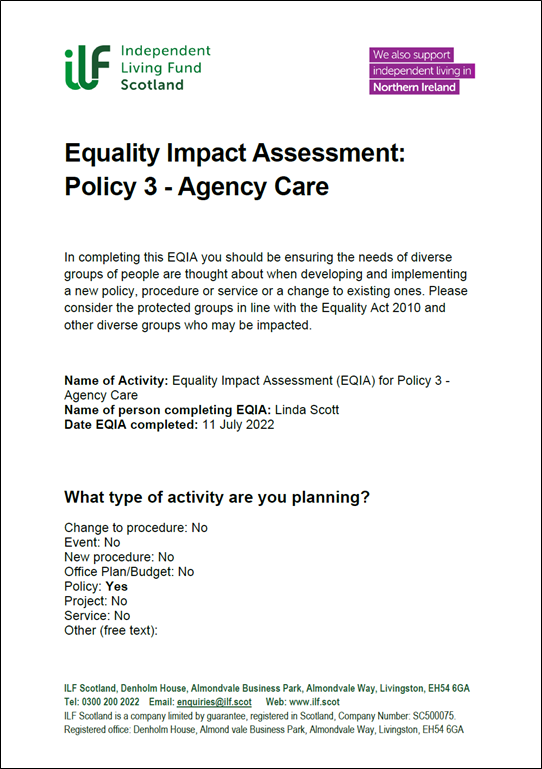
In completing this EQIA you should be ensuring the needs of diverse groups of people are thought about when developing and implementing a new policy, procedure or service or a change to existing ones. Please consider the protected groups in line with the Equality Act 2010 and other diverse groups who may be impacted.
Name of Activity: Equality Impact Assessment (EQIA) for Policy 3 - Agency Care
Name of person completing EQIA: Linda Scott
Date EQIA completed: 11 July 2022
Change to procedure: No
Event: No
New procedure: No
Office Plan/Budget: No
Policy: Yes
Project: No
Service: No
Other (free text):
Annual review and wording revision.
Recipients and ILF Scotland.
The protected characteristics to consider are: Age, Disability, Sex, Race, Religion or Belief, Gender Reassignment, Sexual Orientation, Marriage and Civil Partnership, Pregnancy and Maternity. It will also be helpful to consider these groups more widely in relation to their socio-economic status that includes such factors as educational attainment, occupation, income, wealth and social deprivation.
Please mark as Yes or No. If yes use the Comments column to describe what the potential impact is. What are your sources of evidence?
(Try to think about both positive and negative impacts. There are lots of sources of data to help answer this question. Diversity Networks, the Diversity Report or Diversity & Inclusion team may offer some useful information. Previously completed EQIAs may also offer answers to questions you may have).
Age: No
Comments:
Disability: Yes
Comments: Regulation of social care activities ensures everyone experiences safe, high-quality care that meets their needs, rights and choices.
Sources: About the Care Inspectorate: https://www.careinspectorate.com/index.php/about-us
What the Care Inspectorate does: https://www.careinfoscotland.scot/topics/your-rights/care-inspectorate/what-the-care-inspectorate-does/
Gender Reassignment: No
Comments:
Marriage and Civil Partnership: No
Comments:
Pregnancy and Maternity: No
Comments:
Race: No
Comments:
Religion or belief: No
Comments:
Sex: No
Comments:
Sexual orientation: No
Comments:
(For example, carer status, single parent, economic exclusion. It is important not to limit your thinking just to the protected characteristics listed above. This question is broadening the EQIA out to be more inclusive. The impact might be a negative one (e.g. making that decision could decrease the opportunity for some people to participate) or it could be a positive one (e.g. by making that decision, more people are able to take part in the activity).)
Carers: Yes
Comments: Carers can be reassured that support or assistance provided to their loved ones is regulated and protected by legislation.
If there are any gaps in information that make it difficult or impossible to form an opinion on how your policy, service or change might affect different groups of people, please take the time to gather information to help you make an informed answer (for example, review statistics, survey results, complaints analysis, consultation documents, customer feedback, existing briefings submissions or business reports, comparative policies from external sources and other Government Departments etc).
Desk research.
Age: No
Disability: No
Gender Reassignment: No
Marriage and Civil Partnership: No
Pregnancy and Maternity: No
Race: No
Religion or belief: No
Sex: No
Sexual orientation: No
Recipients and Award Managers - no adverse impact identified.
Age: No
Disability: Yes
Comments: As above
Gender Reassignment: No
Marriage and Civil Partnership: No
Pregnancy and Maternity: No
Race: No
Religion or belief: No
Sex: No
Sexual orientation: No
We will ensure that Policy 3 - Agency Care is in line with existing legislation and guidance, and monitor the legislative landscape for amendments that may affect this policy in future.
Annual review, ongoing monitoring. Signed off by Director of Policy, Linda Scott.